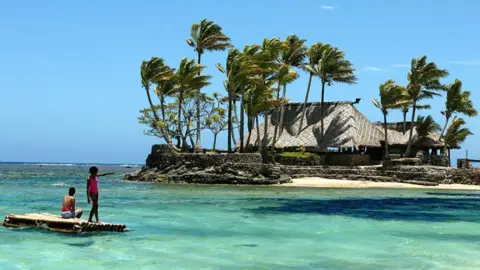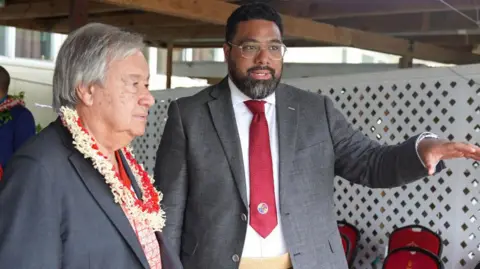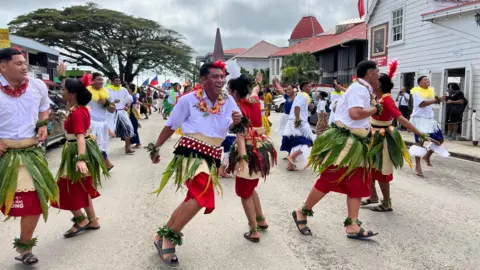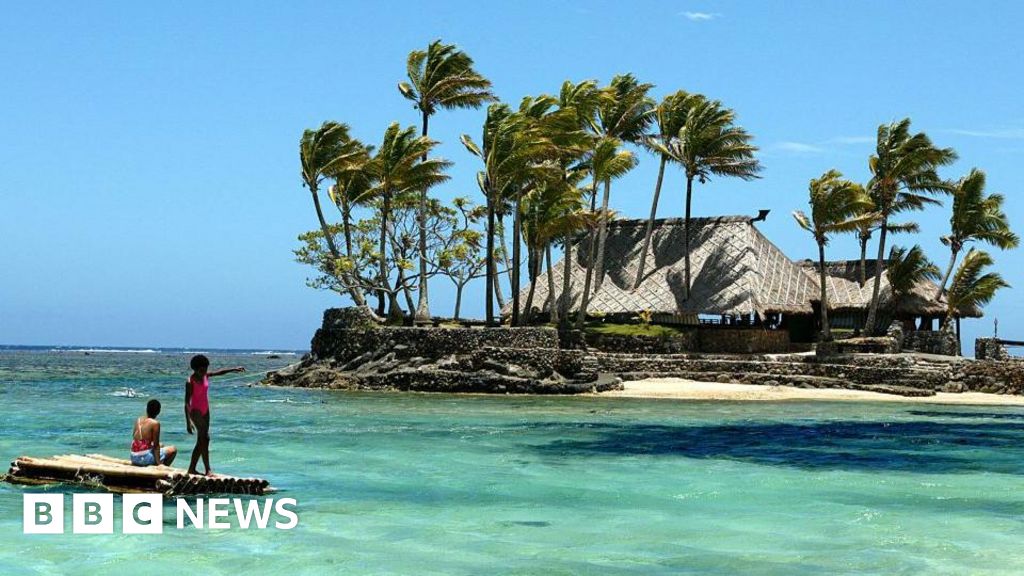 Getty Images
Getty ImagesU.N. Secretary-General Antonio Guterres said large polluters have a clear responsibility to reduce emissions or risk global catastrophe.
“The Pacific is the most vulnerable region in the world today,” he told the BBC at a Pacific Islands Forum leaders’ meeting in Tonga. “There are huge injustices in the Pacific and that’s why I’m here. “
“These small islands don’t cause climate change, but everything that happens because of climate change is multiplied here.”
But as the United Nations released two separate reports on rising sea levels and the threat they pose to Pacific island nations, he warned in a speech at the forum that “rough seas will eventually befall us all”.
world meteorological organization Southwest Pacific climate conditions The region faces a triple whammy of accelerating sea level rise, ocean warming and acidification – an increase in ocean acidity as it absorbs more and more carbon dioxide, the report said.
“The reason is clear: greenhouse gases – largely produced by burning fossil fuels – are eating away at our planet,” Guterres said in a speech at the forum.
“The sea is literally absorbing the heat.”
This year’s theme – Transformative Resilience – was put to the test on opening day when the new auditorium was flooded by heavy rains and the building was evacuated due to an earthquake.
Joseph Sikulu, Pacific director of climate change advocacy group 350, told the BBC: “This is a stark reminder of how volatile the situation is in our region and how important it is that we need to be prepared for anything.”
A street parade was held not far from the venue, with dancers representing the region, including Torres Strait Islander, Tongan and Samoan people. At the beginning of the march, a large banner read: “We are not drowning, we are fighting.” Another said: “Sea levels are rising – and so are we”.
It echoes a challenge that threatens to wipe out their world – the United Nations climate action group has released a report called “A rough sea in a warming world” Shows that global mean sea level is rising at an unprecedented rate in the past 3,000 years.
 Getty Images
Getty ImagesOver the past 30 years, water levels have risen an average of 9.4 centimeters (3.7 inches), but in the tropical Pacific, the figure has been as high as 15 centimeters, the report said.
“It’s important for leaders, especially leaders like Australia and New Zealand, to witness these things firsthand, but also to witness the resilience of our people,” Mr Sikuru said.
“A core part of Tongan culture is our ability to continue to be happy in the face of adversity, and that’s how we practice our resilience and to see and witness that, I think that’s going to be important.”
This is the second time Secretary-General Guterres has attended the Pacific Islands Forum Leaders’ Meeting. The annual meeting brought together leaders from 18 Pacific Islands including Australia and New Zealand.
As leaders held the official opening ceremony, heavy rains caused massive flooding. Shortly after, a 6.9-magnitude earthquake struck Tonga, highlighting the region’s vulnerability.
In 2019, Mr. Guterres traveled to Tuvalu, where he sounded the alarm about rising sea levels. Five years on, he says he’s seen real change.
“Everywhere we look we see huge commitments to fight climate change, to reduce the negative impacts of climate change,” he told the BBC. “The problem is that the Pacific Islands also suffer another huge injustice – being stranded for support The international financial instruments that exist for such countries are not designed for such countries.”
Guterres on Monday visited local communities whose livelihoods are threatened by rising sea levels. They’ve been waiting seven years for a decision on seawall funding.
“The bureaucracy, the complexity, the lack of urgency because it’s a remote island,” he said, citing the failures of the international financial system, especially for developing small island nations.
“People have promised to increase funding for climate change adaptation in developing countries, but the reality is that we are still far from the solidarity these countries need to survive.”
 BBC/Katie Watson
BBC/Katie WatsonMany Pacific Islanders in attendance singled out Australia, the region’s largest donor and emitter.
Earlier this year, Prime Minister Anthony Albanese said Australia would increase the extraction and use of natural gas “in 2050 and beyond” despite calls to phase out fossil fuels.
When Guterres was asked by the BBC what message he had for regional emitters such as Australia, he said: “The big polluters have an important responsibility.”
Otherwise, the world will exceed the 1.5 degrees Celsius threshold set by the 2015 Paris Agreement. Within the safe range of 1.5C.
“Only by limiting warming to 1.5 degrees Celsius will we have any chance of preventing the irreversible collapse of the Greenland and West Antarctic ice sheets and the catastrophe that would ensue,” Guterres said.
“This would mean a 43% reduction in global emissions from 2019 levels by 2030 and a 60% reduction by 2035.”
But global emissions increased by 1% last year.
“The G20, which accounts for 80% of emissions, has an obligation to unite and guarantee immediate emissions reductions,” Guterres said.
He singled out the G20 and companies that contribute significantly to global emissions, adding: “They have a clear responsibility to reverse current trends. Now is the time to say ‘enough’.”


